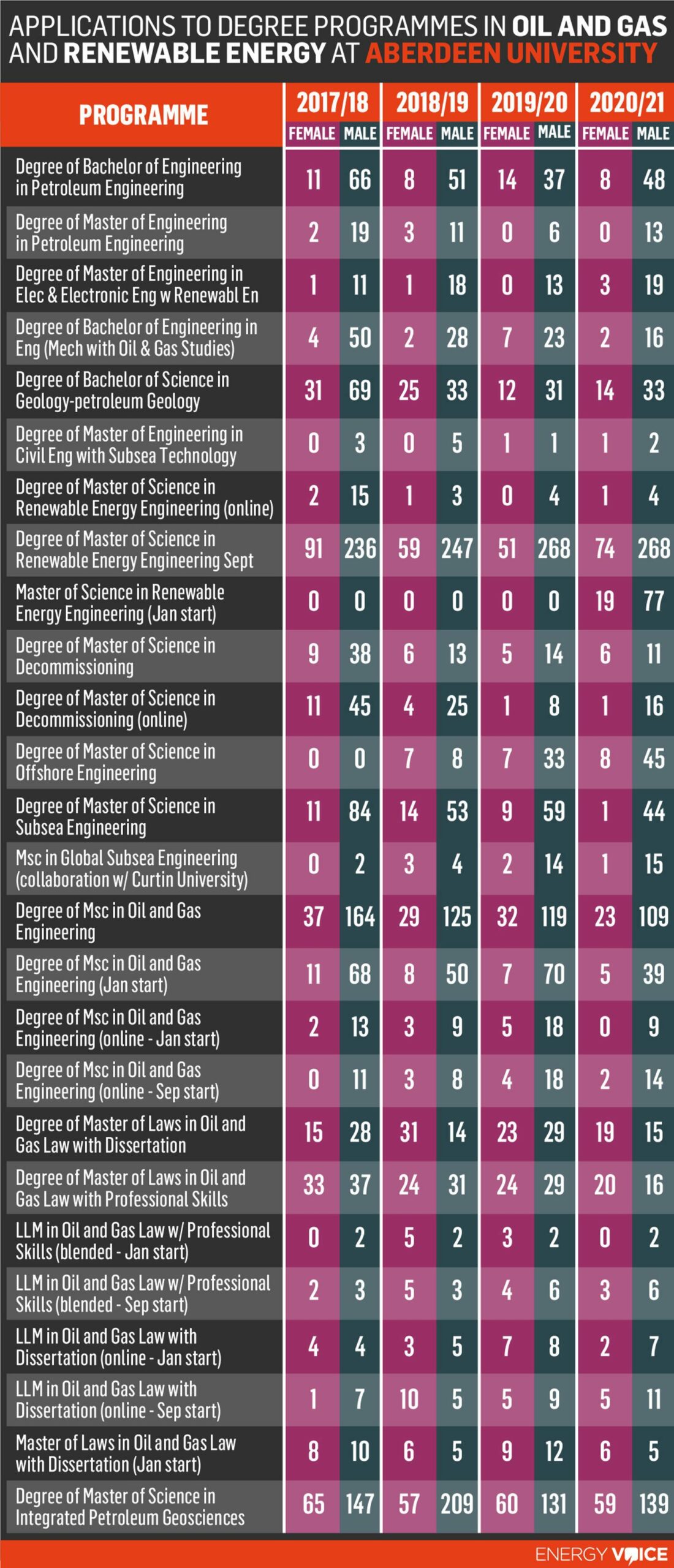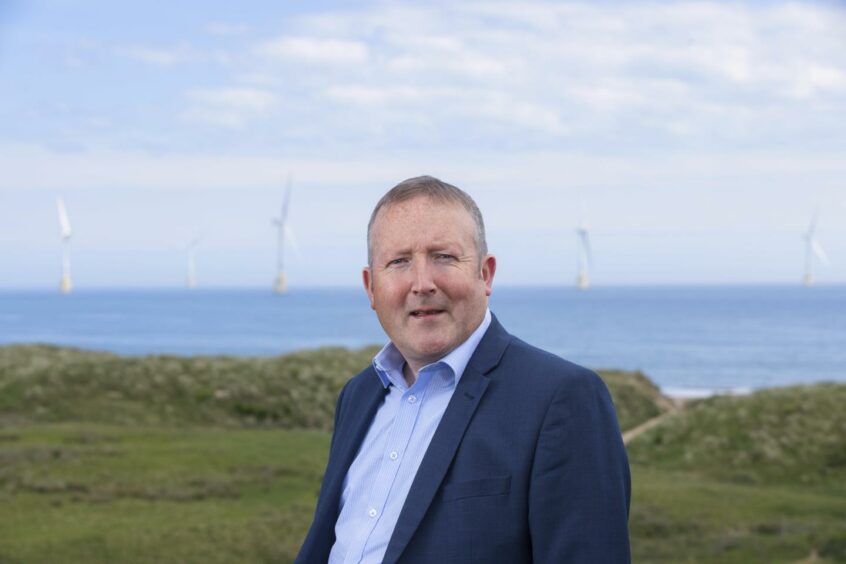
There has been a general uptick in the number of students applying to degree programmes at Aberdeen University revolving around renewable energy.
It is a different picture for oil and gas related programmes though, with the amount of prospective students on a sharp downward trend, figures obtained by Energy Voice under Freedom of Information show.
For all degree courses at the university explicitly related to oil and gas, there were 1,027 applications in 2017/18.
Of those, 246 were lodged by women and 781 were by men.
But by 2021/22 the total number of oil and gas degree applications had fallen to 690, 179 women and 511 men.

Course by course
Looking at specific courses, Aberdeen University received more than 200 student applications in 2017/18 for its MSc degree in oil and gas engineering.
Since then that figure has progressively dropped and in 2020/21 there were only 132 students that lodged a bid to pursue the course, including just 23 women.
Moreover, despite an upcoming and long-awaited boom in the decommissioning sector, courses related to removing and disposing offshore assets have suffered too.
Across online and in-person programmes, there were 103 applicants for the degree of master of science in decommissioning in 2017/18 – in 2020/21 just 34 students put their hat into the ring to study the course.
There were degrees that bucked the trend though, with applications to the likes of oil and gas law, and integrated petroleum geosciences remaining relatively flat.
Offshore and subsea engineering courses enjoyed a healthy growth in interested students too.
John Underhill, director of Aberdeen University’s Centre for Energy Transition (CET), said: “Being at the heart of the UK’s energy industry in Aberdeen means the University offers a broad range of energy-related programmes, reflecting a decades-old pattern of updating and adapting our courses in consultation with industry to ensure that we produce quality graduates with the skillsets to make real and lasting contributions to the sector.
“There are a variety of reasons for fluctuations in the number of applications to our programmes, and of course the growth in interest in courses related to the energy transition reflects sector and societal ambitions around net zero. Meanwhile, interest in our long-standing oil and gas programmes remains healthy, particularly from international students.
“These courses should not be considered as standing in isolation to each other, but as part of a broader and complimentary mix where the skills learned by all our students are directly applicable to the energy transition – acknowledging the significant role the oil and gas industry plays in this regard, and the broader aims of the sector.”
Fears of a skills shortage
With oil prices rebounding to levels not seen for years, concerns have been raised about an imminent energy skills shortage, particularly ahead of the transition push.
Those fears have been aggravated by the level of redundancies since the start of the pandemic, though union figures have said there is “no shortage” of willing workers.
Alix Thom, trade body Offshore Energies UK’s (OEUK) workforce engagement and skills manager, said: “Universities play a key role in attracting people to the energy sector and developing the future talent required across a range of subjects, including engineering, data science, analytics, automation and new materials, all of which will continue to be highly valued as we progress to a lower carbon economy.
“Industry is working with a number of universities to ensure course contents remain current to excite and equip the energy workers we will need to achieve our collective net zero targets.”

Renewables on the up
Oil and gas’ loss has been renewables gain though, with figures showing a steady increase in the number of students wanting to be part of the energy transition.
Applications for degree programmes related to renewables rose from 356 in 2017/18 to 584 in 2020/21.
A large gender gap remains though and of those 584 students who applied, less than a quarter (116) were women.
Of all the green energy courses, the university’s MSc in renewable energy engineering accounted for almost all of the interest, with 562 applicants.
Aberdeen University was unable to give data on the academic years 2021/2022 or 2022/2023 due to “commercial interests”.
Chief executive of Aberdeen Renewable Energy Group, David Rodger said: “It is great to see the interest in renewables courses on the rise. This is vital as the broader industrial and societal energy transition builds momentum and it is important that we continue to attentively inform and encourage the next generation as they consider career paths which will help to deliver a net zero future within a broad energy mix.”
Mr Underhill added: “As a University we continue to grow our teaching capacity and are leading two of the UK Centres for Doctoral Training (CDT), in Oil & Gas and in Geoscience and the Low Carbon Energy Transition (GeoNetZero), from which all 70 graduates have gone into employment, signalling the continued demand for talent. This is in addition to our world-leading undergraduate and MSc programs for which the University is renowned.
“Meeting the challenges of the energy transition is a key area for the University, and our expertise covers a broad range of academic areas that underline our interdisciplinary approach. We continue to evolve and grow in response to the needs of the energy industry, to provide the skills and talent vital to realising net zero ambitions.”
Recommended for you


 © Supplied by Aberdeen University
© Supplied by Aberdeen University © Supplied by Aberdeen Renewable E
© Supplied by Aberdeen Renewable E